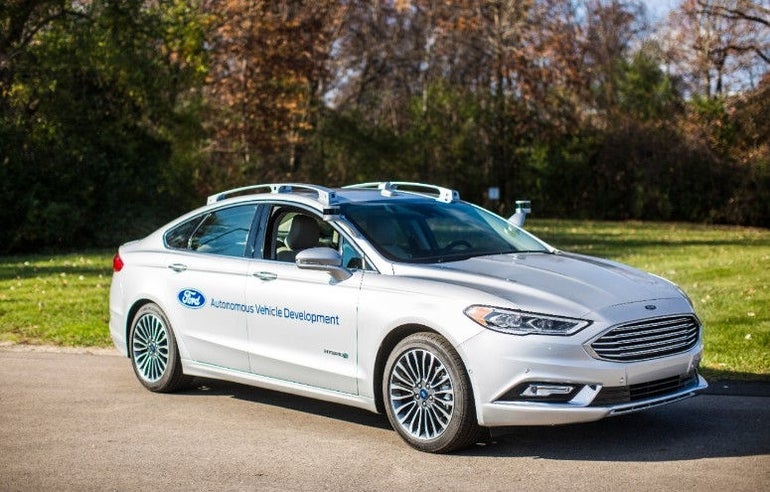Just as an executive from each company described to a Beacon Hill forum Wednesday how they see the future of autonomous cars playing out, Ford Motor Company and Lyft announced they are teaming up to deploy self-driving Fords on Lyft’s ride-hailing service by 2021.
The partnership aims to marry Lyft’s technology, customer base and knowledge of urban transit with Ford’s autonomous vehicle technology development and large-scale manufacturing capabilities. That marriage, the companies said, “will accelerate our efforts to build a profitable and viable self-driving vehicle business” and bring driverless cars into the mainstream.
“Think of it this way: Someday, when you open the Lyft app during a period of high demand, Ford and Lyft software will need to be capable of quickly dispatching a self-driving vehicle so that you can get to your destination as quickly and as safely as possible,” Sherif Marakby, Ford’s vice president of autonomous vehicles and electrification, said in a statement.
For Lyft, partnering with Ford is the latest in a series of similar moves. The ride-hailing app company has already started developing an open source platform that would enable it to deploy self-driving cars made by other manufacturers, including General Motors and Jaguar Land Rover.
Autonomous vehicle technology has advanced rapidly as tech giants like Google, Lyft, Uber and Tesla compete for the upper hand in that arena and governments try to accommodate that development without putting their citizens at risk.
Driverless vehicles hold the promise of reducing the number of fatalities on the roads — nationally 35,200 people died in traffic crashes in 2015 — but could also be applied as a form of public transportation and may encourage trends that would reduce greenhouse gas emissions from the transportation sector.
“There is no doubt self-driving vehicles will have an impact on how people and goods will move more efficiently in the future,” Marakby said. “But the magnitude of that impact — and how quickly self-driving vehicles can benefit society — will largely depend on businesses, government and the public working together.”
In the absence of any state law addressing driverless cars, the Baker administration has set up a working group that will consider laws and regulations. The Massachusetts Department of Transportation and the city of Boston have authorized nuTonomy to conduct testing in the city’s Seaport district and a second company, Delphi, is not far behind.
“We’re actually not looking for legislation,” Transportation Secretary Stephanie Pollack said Wednesday. “Things are moving so fast that it makes more sense to do it with a more flexible process based on an executive order and regulation and collaboration and memorandums of understanding than we think it makes sense to spend a lot of time writing a statute that is likely to be outdated pretty much by the time we start to implement it.”
Ford is developing a fully autonomous vehicle — no steering wheel, brake or gas pedals, and no driver required — by 2021, Ford Smart Mobility’s director of city solutions Jessica Robinson said Wednesday at a transportation forum hosted by the Massachusetts Taxpayers Foundation.
Robinson was joined Wednesday by Corey Ershow, transportation policy manager for Lyft, who said partnerships like the one his company announced with Ford will be critical to the development of autonomous cars because they can better deliver on their potential as part of a ride-sharing network.
“If autonomous vehicles are owned by individuals, not that much changes. You’re still going to have, for the most part, one person to one vehicle,” he said, adding that ownership costs will also remain high. “We can actually bypass all those barriers if you move to a shared model.”
Lyft believes that no later than five years from now a majority of the rides it provides will be in a fully autonomous vehicle, Ershow said. And by 2025, Ershow predicted, “private car ownership in major U.S. cities all but ends” because electric driverless cars will be able to get people wherever they are going more safely and more efficiently.
State officials meanwhile are hoping that private car ownership does not end, at least not when it comes to electric vehicles.
Massachusetts is obligated, as part of a multi-state pact that aims to help states like Massachusetts meet greenhouse gas reduction goals while also creating a sustainable consumer market for zero emission vehicles (ZEVs), to have 300,000 ZEVs on the road by 2025. Through the end of June, there are 11,014 ZEVs registered in Massachusetts, according to the Association of Global Automakers.
Toyota and Mazda announced Thursday they are joining forces with Denso Corporation to form a new company that will develop electric vehicle technologies. None of the companies have to this point been at the forefront of electric vehicle technology, but they hope to get there by working together,
“With EVs yet to find widespread market acceptance, the huge investments and time required to cover all markets and vehicle segments is a pressing issue for individual automakers when responding to the widely varying demand for vehicles around the world,” Toyota wrote in its announcement of the partnership. “This agreement covers a diverse range of models, from minivehicles to passenger vehicles, SUVs, and light trucks, and aims to innovate the development process by combining the strengths of each company.”

